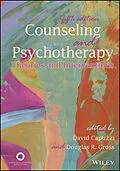This student-friendly and well designed introductory text provides a thorough overview of 14 widely used theories. Experts examine each theory from the perspective of its historical background, major constructs, goals, cross-cultural considerations, and limitations. Traditional and brief interventions integrate theory with specific counseling strategies, giving students further insight into the counseling process and guidance in developing their personal counseling style. A consistent case study across chapters reinforces the differences between theories and illustrates assessment of client concerns and treatment planning. Introductory chapters explore core dimensions and brief approaches to the helping relationship, and how to best deliver counseling and advocacy services to diverse client groups. A complimentary test manual and PowerPoints for instructors' use are available by request on university letterhead.
*Requests for digital versions from the ACA can be found on wiley.com.
*To request print copies, please visit the ACA website here: http://isgweb.counseling.org/ISGweb/Purchase/ProductDetail.aspx?Product_code=78118
*Reproduction requests for material from books published by ACA should be directed to permissions@counseling.org
Autorentext
David Cappuzzi is core faculty member in the mental health counseling program at Walden University; a Senior Faculty Associate in the Department of Counseling and Human Services at Johns Hopkins University; and Professor Emeritus at Portland State University. He is the former president of the American Counseling Association and an ACA Fellow.
Douglas R. Gross, PhD, is a professor emeritus at Arizona State University, Tempe, where he served as a faculty member in counselor education for 29 years.
Inhalt
Preface v
Acknowledgments ix
Meet the Editors xi
Meet the Contributors xiii
Part 1 FOUNDATIONS FOR INDIVIDUAL COUNSELING AND PSYCHOTHERAPY
Chapter 1 Helping Relationships: From Core Dimensions to Brief Approaches 3
Douglas R. Gross and David Capuzzi
Chapter 2 Diversity and Social Justice Issues in Counseling and Psychotherapy 29
Deborah J. Rubel and Manivong J. Ratts
Part 2 THEORIES OF COUNSELING AND PSYCHOTHERAPY
Chapter 3 Psychoanalytic Theory 59
Adrianne L. Johnson
Chapter 4 Jungian Analytical Theory 77
Abbé Finn
Chapter 5 Adlerian Theory 95
Chapter 6 Existential Theory 119
Mary Lou Bryant Frank
Chapter 7 Person-Centered Theory 143
Richard J. Hazler
Chapter 8 Gestalt Theory 167
Melinda Haley
Chapter 9 CognitiveBehavioral Theories 193
Cynthia R. Kalodner
Chapter 10 Dialectical Behavior Theory 215
Laura R. Simpson
Chapter 11 Rational Emotive Behavior Therapy 237
Ann Vernon
Chapter 12 Reality Therapy/Choice Theory 263
Robert E. Wubbolding
Chapter 13 Family Theory 287
Cass Dykeman
Chapter 14 Feminist Theory 313
Barbara Herlihy and Vivian J. Carroll McCollum
Chapter 15 Transpersonal Theory 335
Jonathan W. Carrier and Nathanael G. Mitchell
Part 3 INTEGRATIVE APPROACHES
Chapter 16 Integrative Approaches: Expressive Arts, Narrative, and Symbolism 357
Walter Breaux III
Name Index 379
Subject Index 391
